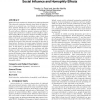Free Online Productivity Tools
i2Speak
i2Symbol
i2OCR
iTex2Img
iWeb2Print
iWeb2Shot
i2Type
iPdf2Split
iPdf2Merge
i2Bopomofo
i2Arabic
i2Style
i2Image
i2PDF
iLatex2Rtf
Sci2ools
110
click to vote
WWW
2010
ACM
2010
ACM
Randomization tests for distinguishing social influence and homophily effects
Relational autocorrelation is ubiquitous in relational domains. This observed correlation between class labels of linked instances in a network (e.g., two friends are more likely to share political beliefs than two randomly selected people) can be due to the effects of two different social processes. If social influence effects are present, instances are likely to change their attributes to conform to their neighbor values. If homophily effects are present, instances are likely to link to other individuals with similar attribute values. Both these effects will result in autocorrelated attribute values. When analyzing static relational networks it is impossible to determine how much of the observed correlation is due each of these factors. However, the recent surge of interest in social networks has increased the availability of dynamic network data. In this paper, we present a randomization technique for temporal network data where the attributes and links change over time. Given data...
| Added | 06 Dec 2010 |
| Updated | 06 Dec 2010 |
| Type | Conference |
| Year | 2010 |
| Where | WWW |
| Authors | Timothy La Fond, Jennifer Neville |
Comments (0)

